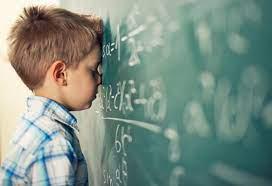
“The worst thing to do is create situations of pressure, intimidation, high emotion, frustration and raised voices,” says Daniel Ansari, a professor of psychology and education at the University of Western Ontario, who studies how humans develop mathematical skills. Math anxiety is a common psychophysiological reaction characterized by feelings of dread and apprehension, increased heart rate and sweating. Up to 30 percent of people report moderate to high levels of math anxiety, a condition researchers have observed in children as young as 6. In brain-image scans, math-anxious children show more activity in the amygdala, a part of the brain central to processing fear.
When you work on calculations with children, try to do so with curiosity, playfulness and a sense of adventure. Never tell a child that they are inherently bad or good at math (or anything else for that matter). “We’re doing children a disservice by introducing them to this notion of a ‘math person,’” Ansari says. A child’s brain is still developing; don’t presuppose their strengths or weaknesses. What a child struggles with today, he or she may excel at later. “If you apply yourself and practice, you can get better at math,” Ansari says.
Math anxiety has contagious qualities. Studies show that students with teachers who lack math confidence become more uneasy themselves. Same goes for math-anxious peers. Research also suggests more math homework may result in increased math anxiety and worsen math performance. “If you are a parent who’s highly math-anxious, maybe try not to do too much math homework with your child,” Ansari says. Don’t necessarily outsource it to private tutors either — Ansari’s research shows that math tutoring outside school is associated with increases in children’s apprehension. More pressure can backfire.
Some of this angst must be addressed by educational systems, but individuals can help shift the culture away from a dread of calculations, too. Often, strangers in the United States and Canada will confess to Ansari that they feel they’re terrible at math. That’s not the case everywhere. “There are places where everybody is considered to be capable of doing math,” Ansari says. “And they are.”
Source: The New York Times
https://www.nytimes.com/2022/03/22/magazine/kids-math-anxiety.html
 FR
FR EN
EN AR
AR








